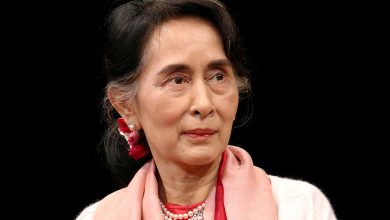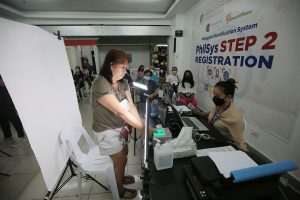Marcos as the scapegoat

It’s been 36 years since EDSA I.
As of this writing, that’s 13,314 days and 16 hours from 9 p.m. of Feb. 25, 1986, the day Ferdinand Marcos the Elder left Malacañang. Make that 319,554 hours of one president and his family living rent free in the heads of so many Filipinos today. Every political leader is gauged whether he’s “Marcosian” or not. We’ve had elections three decades later that essentially forgot about current issues and instead revolved around his legacy. The Supreme Court had to decide how he was to be buried. We have two dueling movies right now essentially about that one single presidency. What’s up with that?
It can’t be his longevity, those 20 years he held power. Gloria Macapagal-Arroyo was president for an impressive nine years and yet barely is the subject of historical study (as of now). Martial Law? It’s implementor, Fidel V. Ramos, died merely weeks ago, and except for a few days of praise and reminisce, the national conversation promptly went back to the bashing or defending a man that’s been dead for 33 years.
And then there’s the hatred. The absolute engulfing hatred, contempt, even shows of disgust, that some are wont to express of a level worthy for Hitler. Of whom FM is oft compared to. But to compare the former Philippine president to a man that ordered the killing of six million Jews borders on the eccentric.
There are the plunder allegations, essentially none of which have been conclusively or categorically proven in court or decided with finality. And if one goes by mere allegations, then many a succeeding president has been equally as bad in that regard.
Human rights violations? Of the 75,730 abuse claims filed in relation to the 1970s martial law, only 14.66% or 11,103 have been recognized as valid by the Human Rights Victims’ Claims Board (HRVCB) to date. Compare that, and more specifically compare the 2,326 deaths recognized by the HRVCB with the more than 12,000 deaths alleged by Human Rights Watch that supposedly occurred during the six years of Duterte’s presidency. Or compare that with the alleged 50,000 murders committed by the CPP-NPA (Communist Party of the Philippines-New People’s Army).
Consider further that of today’s 110 million Philippine population, 75% (or 82.5 million) were born after Martial Law. A further 10% (or 11 million) were merely toddlers or in grade school when Martial Law was imposed. That makes 93.5 million. Which means only the remaining 15% had direct actual experience of Martial Law.
Which begs the question: considering this country went through invasions, a war of independence, a world war, bloody communist and Muslim insurgencies, cataclysmic earthquakes, storm floods, and volcanic eruptions, can the entire country really be this rabidly divided over a single presidency, complete with an overly loud and emotional, sometimes bordering on in-need-of-therapy hatred by a segment of the population whose only knowledge of what happened in the 1970s came from secondhand sources most likely inclined to favor the Aquino family during the total 12 years of their presidencies?
ALL THAT HATREDIt’s this disproportionate amount of vitriol that makes one ponder.
It has all the rationality of the hatred for a parent or lover where the feelings and memories remain but the relationship has gone terribly wrong. Or is it perhaps projection?
An offhand comment by Roger Scruton perhaps leads us to a possible answer: “I was reminded actually of the theory that Rene Girard, the French philosopher and anthropologist produces to explain the scapegoat phenomenon. His view is that, at the heart of every society, there are these huge tensions, caused by the fact that others have what you want essentially and that you’ve been excluded from what you deserve etc. These tensions build up and they’ve been building up in our society as we know…”
Thus, there develops “a need for a victim to persecute when that happens. You single him out and it’s necessary that he should be innocent. If he’s actually guilty of something then you can’t pour all your venom into him. So here is the lamb led to the slaughter and of course we have the great example in Christ whose crucifixion would have meant nothing if he weren’t actually innocent. And the pursuit of the scapegoat for Girard is the way in which a society relieves itself of this burden of mutual resentment growing within it.” (The Spectator, “Full transcript: Douglas Murray in conversation with Roger Scruton,” May 8, 2019)
THE MAN SINGLED OUTThe hatred for that one “singled out” is perhaps the key. How many can honestly say, particularly then and even now, that he would have acted differently from Marcos if he had been placed in a similar situation? History doesn’t give us an optimistic answer.
Joe Studwell, in his book Asian Godfathers: Money and Power in Hong Kong and Southeast Asia, made an analysis on the Philippines that is particularly relevant: “The old political elite, restored by godfather progeny Corazon Aquino after Marcos’ departure in 1986, appears as entrenched as ever. The current president, Gloria Macapagal-Arroyo — herself the daughter of a former president — spends much of her time fending off congressional attempts to impeach her because of the possibly unconstitutional manner in which she ousted her predecessor, Joseph Estrada, 2001, and allegations of vote-rigging in her own election victory in 2004. x x x Faith in the political process is falling, communist insurgency is present in most provinces, and the local elite remains the most selfish and self-serving in the region. The Philippines best known living author, Francisco Sionil Jose, lamented in the Far Eastern Economic Review in December 2004: ‘We are poor because our elites have no sense of nation. They collaborate with whoever rules — the Spaniards, the Japanese, the Americans and, in recent times, Marcos. Our elites imbibed the values of the colonizer.’ The Philippines, in short, has never moved on from the colonial era and the patterns of amoral elite dominance that it created.” (Asian Godfathers, 2007, pp.180-181)
A reading of Sandra Burton’s Impossible Dream shows how those in power were so inextricably linked to each other that our history is seemingly like one long political rigodon. If Burton’s account is accurate: it was a Laurel who acquitted Ferdinand Marcos of murder, a Roxas who liberated him from a US army brig, a Quezon who urged him to be in public life, a Macapagal who awarded him half of his war medals, and a Magsaysay who served as godfather to his wedding. Marcos had Ninoy Aquino as a fraternity brother. And before Aquino married Cory, he was actually dating, guess who? Imelda Romualdez.
Ferdinand Marcos, intelligent, disciplined, athletic, with a beautiful wife and children. Even setting aside the issue of war medals, he was a man that had gone through war. Who topped the Bar Exam while in jail awaiting trial for the murder of his father’s political enemy. An achiever who surrounded himself with other achievers, his cabinet one of “technocrats,” people that worked in multinationals or studied in UP or Harvard.
A CLEANSING OF HANDSPlace all that within this context: a president that — while admittedly wealthy — did not come from the ranks of the supposed “de buena familias” of Philippine society, of which — more to the point — many were accused of being collaborators with either the Spanish, Americans, or the Japanese (and of the latter many would have been charged for treason had not Douglas MacArthur reportedly intervened to stop the prosecutions), and had also mismanaged the country for most of the life of the Third Republic.
So, the “elite,” the same elite that controls media, the academe, business, and politics, many of whom are donors to religious organizations, needed someone to blame. Someone to blame for their own corruption, for their own mismanagement, for their own failings and flaws. A scapegoat was needed.
Scapegoat. As one definition puts it: the one “upon whose head are symbolically placed the sins of the people.”
Or from the Encyclopedia of Social Psychology: “Scapegoat theory refers to the tendency to blame someone else for one’s own problems, a process that often results in feelings of prejudice toward the person or group that one is blaming. Scapegoating serves as an opportunity to explain failure or misdeeds, while maintaining one’s positive self-image. If a person who is poor or doesn’t get a job that he or she applies for can blame an unfair system or the people who did get the job that he or she wanted, the person may be using the others as a scapegoat and may end up hating them as a result.”
DON’T NEED NO EDUCATIONAnd many of our idealistic youth, rightly frustrated with our country’s continuing and repeating problems, were “conditioned” into believing it. Conditioned, not educated, because the latter presupposes the ability to critically think, which means allowing dissenting thought, and dissenting thought, at least with respect to analyzing the Marcos era, was simply forbidden until recently. And again, many of our youth, either due to kind faith or trust in media or the academe or their church, or some perhaps fearful of being a pariah or of losing popularity or a promotion, went along with it.
LIES, GOSSIP, HISTORY, AND TRUTHNone of this is to absolve anyone of any responsibility for any wrongdoing. But accountability must be had with justice, and justice needs to be rooted in truth. Not the truth of supposed academics or “historical experts” claiming infallibility and exemption from being questioned. But truth of complete, rather than selective, facts and viewed realistically through human experience and logic rather than emotion or jejune idealism. Less than that, history is merely gossip. And history is what we should learn from, not gossip.
A country can’t be built on lies. No life should be built on it. A person will always know when truth is absent no matter how much he tries to deny it. Doubt will gnaw at his being. That’s how fanatics are born and sadly fanatics now litter our national conversation. That is unfortunate. To borrow from George Smiley, fanatics are lost and will come to nothing precisely because he “is always concealing some secret doubt.”
In the end, what is indeed needed for this country is to value the truth and follow it wherever it may lead. Even though it may be truth that blasts our most cherished beliefs and assumptions. Part of that truth is the need to hold people accountable, yes, but also for everyone to assume self-responsibility rather than passing blame.
Jemy Gatdula is a senior fellow of the Philippine Council for Foreign Relations and a Philippine Judicial Academy law lecturer for constitutional philosophy and jurisprudence
Twitter @jemygatdula




